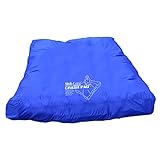My Passions
I often describe myself as a proudly disabled travel lover and adventure seeker! My social media and so many of my stories and conversations share highlights from my globe-trotting getaways. The beach, the jungle, the mountains, that glistening sunrise over glass water, oh so glorious and serene, so perfect to place on a squared grid of visuals that depict a piece of who we are. But while those brightly colored magical moments that win the attention of Instagram, and that certainly are very exciting to share, in reality they are not what make up my every day, or my every week, or even my every month. Instead, I spend most of my waking hours working in some capacity at my job as a Speech-Language Pathologist (SLP). Although far less photo-worthy, and sometimes difficult to deeply divulge due to confidentiality reasons, I feel immense passion for the work that I do as an SLP.
Drawing Upon Personal Experience
I am a full-time manual wheelchair user and have been disabled since birth. My work as an SLP has been in the healthcare field for the entire length of my 12 year career to date. I am employed full-time at an adult inpatient rehabilitation center on the stroke/neurological unit, having also spent time providing coverage in palliative care, ICU, emergency and general geriatric rehabilitation. I have also recently taken on additional work in the community, providing services to clients in long term care homes and retirement homes. I spend a lot of time deep in my thoughts about moments when my beliefs and lived experience with disability seem at odds with the process and principles of more traditional rehabilitation. I draw upon diverse perspectives from within the disability community that I feel so connected to, in order to work within a social model or biopsychosocial model of disability when providing patient care and advocating for our profession. I think about my time as a patient in my younger years, receiving rehabilitation services, and that vulnerability that I felt; that desperate need to feel understood by those who were so enthusiastic to “treat” me; that dependency on other people for day-to-day tasks; my experience with the healthcare system on the receiving end - and I feel it is these experiences that allow me to do my work well.
The Work of a Speech-Language Pathologist (SLP)
So, what does an SLP do on an adult inpatient stroke/neurological rehabilitation unit? We see patients who are experiencing difficulty with their communication and/or swallowing. Patients may have trouble finding the right words to use, producing words clearly, organizing their thoughts and sentences, attending to information, comprehending written material, or are noticing changes to their voice. Some patients are at risk for choking or having food and liquid enter the airway during meals. As SLPs we help to determine strategies or modifications to the meal that might be easier and safer to manage. We often work together with a dietitian and doctor to sometimes suggest alternate modes of nutritional intake. No work day is the same. I respect being let into someone’s life story and being able to offer care and patience and learning how I can use my skills to best support the patients I meet. It really is wonderful work to help facilitate successful communication, however that may look, or to bring someone their first cup of coffee in months, or to find creative ways for patients to safely experience their favorite tastes.
My typical day starts at 7:15am when I arrive at work after dropping off my husband for his 7:00am shift (also in healthcare). I have time to check for new admissions into the unit, review nursing notes about my patients from the nightshift and plan materials and activities for the day's therapy sessions. I complete swallow assessments during the breakfast hour and lunch hour and the time in between is spent seeing patients for communication assessment and therapy, meeting with families, speaking with the multidisciplinary team and making referrals for various community programs. In the evening before heading home I stop in to see clients at various long term care homes or retirement homes in the city, usually to complete swallow assessments over the dinner hour. I'll often be out late enough that I can swing by and pick my husband back up from his 12-hour shift. We have plenty of stories for each other on the car ride home.
I think part of the pride I do feel towards my work is because of my very visible, physical disability. As a child, instead of asking what grade I was in, adults would ask my parents IF I go to school. Most of my graduation ceremonies did not include a ramp. I couldn’t live alongside my peers in my first year at University because there were no accessible dorms. I missed out on networking events and social gatherings that were planned in inaccessible buildings. I watched interviewers search up and down the hallway for their next candidate, before I’d have to call out an introduction that wasn’t invited. All of these experiences subtly, or not so subtly gave me the message that society does not expect disabled people to pursue higher level education, to become employed, or to hold professional titles. Because of this I can say I’ve had to exercise more patience to allow people more grace, I’ve had to take extra time to educate, I’ve had to do a lot of very quick work to change perceptions, and yet now, here I have brought myself to a position where people are really listening, and want to learn, and are beginning to value disability perspectives on topics related to employment and healthcare.
Disability in healthcare
When I first graduated and was applying for jobs, I consciously sought out work in the healthcare setting because I felt I would be able to take advantage of the accessibility that would naturally have to be in place for the majority of patients and clients receiving service. I still often find myself clearing equipment off to the side in the hallways, climbing onto chairs and beds, navigating very tight spaces, planning extra time in my day to wait on elevators or accessible parking, and advocating alongside the patients for better built environments. It’s ironic that while the consumers of healthcare services are disproportionately disabled, the barriers to accessing equitable health as a disabled person are plentiful. And I too often feel the rage of a system and inaccessible society that make returning to life in the community with a disability more challenging than it needs to be. I believe that having disability represented in the diversity of healthcare staff/stakeholders and policy makers is so, so necessary. I do hope to inspire other wheelchair users and prospective disabled employees to consider a career in healthcare.
We are creative. We are problem solvers. We are planners and organizers; always thinking ahead. We have experienced humility and vulnerability. We adapt. We are exactly what healthcare needs.

























